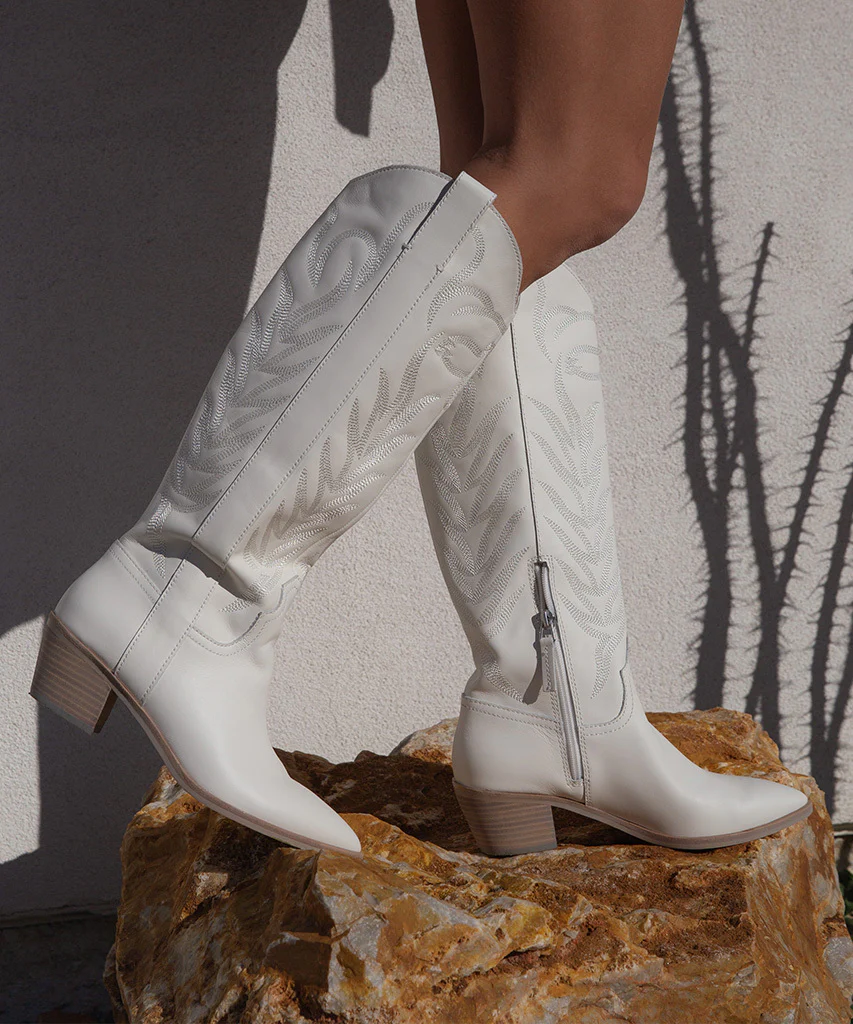Eco-Friendly Manufacturing of White Cowboy Boots
Sustainability in manufacturing processes is an increasingly important consideration for white cowboy boot producers. Here’s how eco-friendly practices can make a difference:
Material Choices: Sustainable cowboy boot manufacturing begins with material selection. Some companies use eco-friendly leather alternatives like vegetable-tanned leather, which uses fewer chemicals in the tanning process, reducing environmental impact.
Reduced Chemical Usage: Minimizing the use of harmful chemicals in the boot production process is crucial. Environmentally conscious manufacturers aim to reduce or eliminate the use of toxic substances and opt for more sustainable alternatives.
Energy Efficiency: Implementing energy-efficient practices in manufacturing facilities reduces the carbon footprint. Using renewable energy sources and optimizing energy consumption contribute to sustainability efforts.
Waste Reduction: Sustainable manufacturers work to minimize waste during production by recycling or repurposing materials and reducing excess in their processes.
Local Sourcing: Sourcing materials locally reduces transportation-related emissions. Manufacturers that prioritize local suppliers contribute to lower carbon emissions and support regional economies.
Sustainable Leather Sourcing for White Cowboy Boots
Leather sourcing is a critical aspect of sustainability in the cowboy boot industry. Ethical and sustainable leather production practices can have a significant impact:
Ethical Animal Husbandry: Sustainable leather sourcing involves ensuring that animals are raised and treated humanely. Leather manufacturers often partner with farms that prioritize animal welfare.
Traceability: Transparency in the leather supply chain is essential. Companies that can trace the origin of their leather back to responsible and sustainable sources demonstrate their commitment to ethical practices.
Certifications: Some leather is certified as eco-friendly, indicating that it meets specific environmental and ethical standards. Look for certifications such as the Leather Working Group’s Gold rating, which signifies environmentally responsible leather production.
Alternative Materials: In addition to traditional leather, sustainable cowboy boot manufacturers explore alternative materials like plant-based or lab-grown leather to reduce the environmental impact of their products.
Recycling and Upcycling Old White Cowboy Boots
Extending the lifespan of white cowboy boots through recycling and upcycling efforts is a sustainable approach:
Repair and Restoration: Repairing and restoring old boots can breathe new life into them. Skilled cobblers can fix issues like sole damage, stitching, or scuffs, allowing boots to continue being worn for years.
Upcycling: Creative individuals and artisans have embraced upcycling as a way to repurpose old boots into unique fashion pieces or decorative items. Upcycled cowboy boots can become stylish and eco-friendly accessories.
Donation and Resale: Donating or selling old boots to others who may still find value in them extends the life of the product and reduces waste. Online marketplaces and secondhand stores offer platforms for resale.
Recycling Programs: Some cowboy boot brands have initiated recycling programs where old boots are collected and repurposed into new products or materials, reducing the environmental impact of discarded boots.
Ethical Concerns in the Cowboy Boot Industry
While sustainable practices are gaining momentum, ethical concerns persist in the cowboy boot industry:
Worker Rights: Ensuring fair wages and safe working conditions for factory and farm workers is a pressing ethical issue. Transparent supply chains and ethical certifications help address these concerns.
Animal Welfare: Ethical concerns related to the treatment of animals in the leather industry are significant. Sustainable leather sourcing includes efforts to minimize harm to animals and prioritize their well-being.
Environmental Impact: The leather tanning process can have adverse environmental effects if not managed responsibly. Addressing these concerns requires the adoption of eco-friendly practices and sustainable materials.
Cultural Appropriation: The use of cowboy boot styles in fashion raises questions about cultural appropriation. It’s essential for brands and consumers to respect the cultural significance of cowboy boots while appreciating their style.
